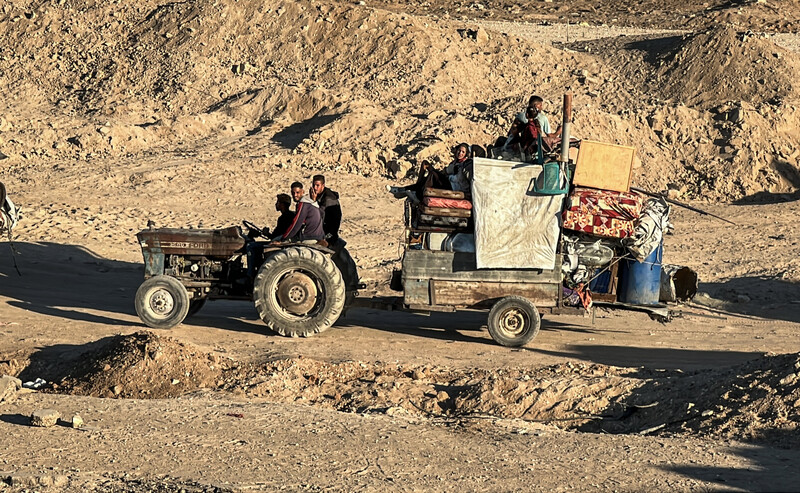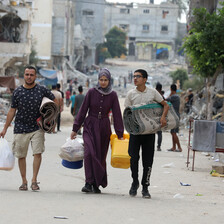The Electronic Intifada 20 October 2025

People have started streaming back to Gaza’s north after a ceasefire was announced on 9 October. Here along what remains of the Salah al-Din road on 15 October.
APA imagesEverything passes in ways that make no sense at all. My family and I ended up displaced to the south, despite our stubborn refusal to ever leave the north.
And now we may suddenly be able to return. Maybe, just maybe, it will last this time.
In those last days before we left, while still in the north, the bombing grew harsher, and the occupation’s tanks crept closer. Shells soared above tents and houses. Quadcopters hovered low, firing at any and all passersby.
Just a few days before our displacement, one of those drones suddenly unleashed heavy gunfire. The sound cut through the air and bullets chipped away at the walls of the house of our relatives, where we had sheltered after ours was destroyed. That was the moment we decided we had no choice but to flee south, hoping that we might still preserve our lives, though the bombing awaited us there too.
We struggled to find any kind of transport to take us south. We carried just our mattresses. The cheapest ride for a single family was more than $2,000. This did not include the price of a tent, wood or renting a piece of land, let alone food and water.
It was a Sunday morning, 21 September. I tried to say goodbye to the city. I was afraid of staying and dying. I was afraid of leaving and being trapped without return.
I wished I could embrace our home and carry it with us. Marah, my five-year-old sister, sitting beside me, asked innocently, “Can’t we just fold up the house and take it with us to the south?” I replied softly, “Why not fold up the whole city instead? Wouldn’t that be better?”
Later I went down to the street to watch how they packed our bedding onto the transport truck. Then, I walked to the patch of land in front of the home. My family was sitting there, peeling and eating pomelos picked from the tree outside the house, their faces heavy with grief.
A memory forced itself into my mind. It was before the genocide, when my life was calm. I would sit on my bed, light a candle and read my books and novels. I loved reading Ghassan Kanafani most of all. I often marveled at how his words seemed to mirror our lives, how his stories felt like our stories. I remembered one of his tales, The Land of Sad Oranges, and how the women wept when the last orange was taken from the orchard.
On the road
The memory shook me – seeing my family holding those citrus fruits now. Was it possible that citrus would be the last thing we carried with us from our land too?
Our belongings left for the south before we did. There wasn’t enough room for us on the small truck. We stayed behind in the house, hoping for another way out, but none came. Finally, after much thought, we decided to go on foot. Our only fear was for the seven little ones, aged between 5 and 10, too frail for such a journey.
We began to walk – my family, my relatives, 31 people in all. There were no streets left, no standing houses, only rubble. So we bade farewell to the ruins, ruins that once had been homes filled with life, and we moved on.
From the very beginning of the road, exhaustion overtook us. I don’t know why, it was a road we had walked countless times before. The heat was relentless.
We weren’t alone. Many families were carrying their belongings and mattresses, while heavy shelling raged all around us. When we reached al-Rashid street, which overlooks the sea, I couldn’t believe my eyes. I had only seen part of the area in May. Before the war, al-Rashid street was the very pulse of life: bright, lively, full of cafés, restaurants and wedding halls. Now, all the towers lay in ruins. Everything seemed drowned in gray.
I looked back and saw al-Majdal – Ashkelon, they call it now – glittering in the distance. The contrast was merciless: my city was buried under rubble and darkness, while over there, a city that was once ours sparkled like stars. We could see their light. Could they see our dark ruins?
Our feet ached, our backs felt broken from exhaustion. We stopped often to rest on the ground and catch our breath. We saw endless waves of displaced people. Like everyone else, I had set out in clean clothes that quickly became stained with dust and dirt.
Hours and minutes passed. We reached Sheikh Ijleen, where we once had a beautiful plot with a large fig tree. The area now had no recognizable landmark. Still, when I walked by, I felt a warmth in my chest.
We passed through Netzarim, once famed for its grapes and figs, now infamous for the many massacres Israel had perpetrated here. We reached Wadi Gaza – which marks the boundary between northern and southern Gaza, as the night swallowed the sky. At that moment, we became displaced.
At the very threshold of the south, tents lined both sides of the road. Nothing looked familiar. It was not the city I knew.
We arrived at the house we had rented from a family in Deir al-Balah where we would now seek shelter, at around midnight. I collapsed into sleep without even changing my clothes. The next morning, the air felt strange. I woke up confused, wondering why I wasn’t at home.
We remain in the south. Our house in al-Shujaiya was bombed in the last days before the ceasefire. There is no home to go back to.
Nadera Mushtha is a teacher/writer in Gaza.



